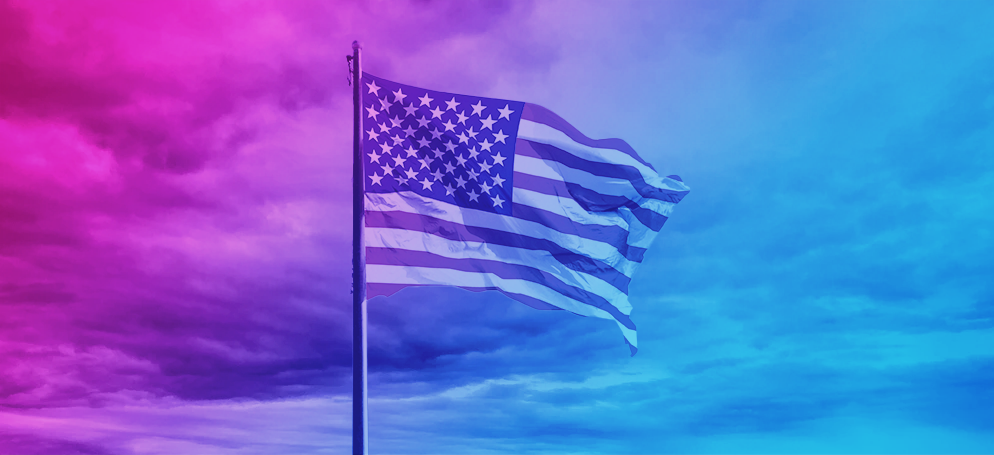
Trump’s social media ban: International implications
On 8th January, Twitter announced it was permanently suspending Donald Trump’s account. Following the riots at the Capitol on 6th January and Trump’s rhetoric before, during and after, the company said there was a danger that further tweets from the President could incite additional violence. In a statement, Twitter said Trump’s tweets breached their Glorification of Violence policy and that no elected official or world leader could be above their rules entirely.
Facebook, Snapchat, Spotify, Twitch, Shopify and Stripe all followed suit. Reddit, TikTok, YouTube and even Pinterest announced new restrictions on posting in support of the President and his actions.
What are the international implications?
Immediately after Twitter’s decision, its share price dropped 12%, losing $5 billion of market value. Facebook also took a hit. Whilst the shares subsequently (partially) recovered, the initial drop was driven in part by investor fears that increased regulation for big tech around the world is now on the way. Whatever the arguments for or against Trump’s ban, politicians around the world expressed disquiet at the idea that US-based tech firms can censor elected figures:
• Angela Merkel, Germany’s chancellor, described the ban as problematic, arguing that curbs on expression should be imposed by law not private companies.
• Bruno Le Maire, France’s finance minister, said that regulation of the digital world cannot be left solely to what he called the “digital oligarchy”
• Alexei Navalny, the Russian dissident and blogger, described the ban as “an unacceptable act of censorship” which would be used by the Kremlin to justify his own blacklisting by state media and “exploited by the enemies of freedom of speech around the world”
Trump’s ban highlights the lack of a unified international approach when it comes to tech regulation. The EU has shown willingness to go further than the US, most obviously with 2018’s General Data Protection Regulation (GDPR) which – in theory – gives users a stronger say over their data. Last month, the European Commission proposed new plans which would impose greater controls on the tech giants with fines for non-compliance – and for repeat offenders, potentially being forced to divest/break up (largely seen as unenforceable in the real world).
In the US, technology companies have traditionally been left to police themselves, though there is growing political desire to limit the legal protections social media companies have from being sued for third-party content posted on their sites. Some members of Congress have pushed for a new federal data privacy bill to mirror the EU’s GDPR.
However, technical regulation can have unintended consequences: compliance tends to be so expensive that only a handful of (mostly US) companies can afford it. This reduces the chances of big incumbents being displaced by upcoming competitors and therefore entrenches power in the hands of a few players.
Cultural attitudes to censorship
Attitudes towards censorship vary around the world. Most famously, in China, there is the Great Firewall, which aims to restrict Chinese access to selected foreign websites (such as Google, Facebook, Twitter and Wikipedia) and to slow down cross-border internet traffic. China views the internet as an issue of sovereignty – the idea that the internet inside the country is part of its sovereignty and therefore should be governed by the country.
One of the main goals of China’s Great Firewall is to create an environment where people have the same values, aligned to Chinese Communist Party ideas – one example being that Taiwan, Hong Kong and Tibet are part of China.
However, China is not the only country with concerns about freedom of speech on the internet. According to the Committee to Protect Journalists, it is only fifth on the list of the top ten most censored countries – which they believe are:
1) Eritrea
2) North Korea
3) Turkmenistan
4) Saudi Arabia
5) China
6) Vietnam
7) Iran
8) Equatorial Guinea
9) Belarus
10) Cuba
The CPS explains here how each country exercises censorship – usually a combination of banning or restricting media, digital and physical surveillance and browbeating journalists – which in turn, leads to self-censorship amongst an intimidated population.
All speech comes from a cultural context which expresses a particular perspective and represents specific interests. Because different cultures exist, there is potential for people to insult the convictions of others through expression on the internet. People from diverse cultural backgrounds have diverse moral values and norms, political and religious attitudes and communication styles. Cultural diversity raises challenging questions for free speech and sets up the potential for disagreement. Geoffrey Miller provides the example of a US college campus which might pay lip service to the idea of “diversity” but in practice, may struggle to accommodate real cultural diversity – such as any Saudi Arabian students with a literal interpretation of the Quran’s teachings on women or Chinese students who believe Xi Jinping’s authority in China is superior to American liberal democracy.
Issues of consistency
Critics of Twitter’s decision to ban Trump were quick to highlight the apparent inconsistency, citing examples such as:
• Iran’s supreme leader, Ayatollah Khamanei, not being banned – despite (for example) reiterating in 2019 a death threat made against Salman Rushdie for writing a novel over 30 years ago.
• Various Chinese government-related accounts tweeting CCP views which are often highly disputed – for example, a 7th January tweet by the Chinese Embassy in Washington which claimed that Chinese government policies had freed Uighur women from being “baby-making machines” (although Twitter did later remove the tweet following a widespread backlash)
The challenge for social media platforms will be to ensure consistency – to avoid the impression of censoring some political figures or viewpoints but not others. This is especially important given the near-monopolistic power of social media, which means big tech has the power to distort the ideas economy and change democratic outcomes by deciding who gets to speak and about what.
Publishers or platforms?
An ongoing debate in recent years has been whether social media companies are publishers or platforms. Trump’s ban has been interpreted as a tacit concession that they are in fact publishers.
Publishers are allowed certain freedoms but also have to follow laws and regulations in each market. This means they can be taken to court or forced to issue corrections if they publish discriminatory or libellous content. Following the ban, we may see more pressure explicitly to define social media companies as publishers – meaning they would be held more accountable for the content on their platforms.
Before the events at the Capitol, the issue had been widely discussed in the US with some lawmakers and Trump himself demanding repeal of Section 230 of the 1996 Communications Decency Act, which blocks liability claims against social media companies for users’ posts on their sites. Section 230 was seen as a protection of free speech.
How should marketers respond?
For international marketers, issues relating to free speech and censorship around the world create challenges. These include:
• State censorship can lead to media platforms or channels in some markets being banned or restricted. Because of this, an Oban client had to delay a week’s worth of advertising when a Kenyan TV station was taken off air by the government. Marketers should be aware when this happens to ensure they receive the full value of any campaigns they have booked.
• Marketers should also recognise the potential for causing offence across cultures. Consumers may not react well to having cultural norms and values from other markets imposed upon them through clumsy if well-intentioned marketing messages, especially those trying to challenge or change behaviours. Be alert to this and when in doubt, consult Local In-Market Experts.
• It’s important to monitor when public opinion or sentiment towards a platform or channel starts to shift. Advertisers are increasingly concerned about media owners which do not have editorial control of their platform as it creates potential brand risk.
• Another reason behind the decline in Twitter’s share price was investor fears that without Trump, the platform will decline in popularity: with 88 million followers, Trump’s was the 6th biggest account on Twitter and his tweets frequently went viral rove up platform engagement. Those followers may now go elsewhere.
• Marketers need to tread a fine line with comments aimed at political leaders. Despite popular UK opinion, 74 million Americans voted for Trump and they may not respond well to brands making jokes about him. Russians felt similarly aggrieved about previous British criticism of Putin and Oban’s research showed it reflected adversely on their predisposition towards buying British brands.
. . .
The challenge for marketers, in a world where global consumers are increasingly scrutinising the brand values of businesses they buy from, is to make sure every marketing action and the potential consumer consequences are considered and intended. To find out how Oban’s LIME network can use cultural insights from around the world to guide your digital marketing activity, please get in touch.

Sarah Jennings | CEO
Oban International is the digital marketing agency specialising in international expansion. Our LIME (Local In-Market Expert) Network provides up to date cultural input and insights from over 80 markets around the world, helping clients realise the best marketing opportunities and avoid the costliest mistakes.